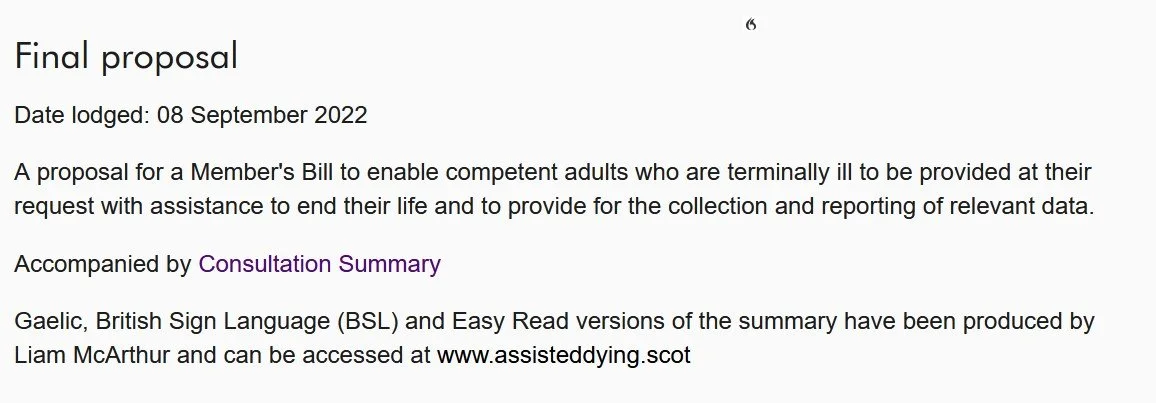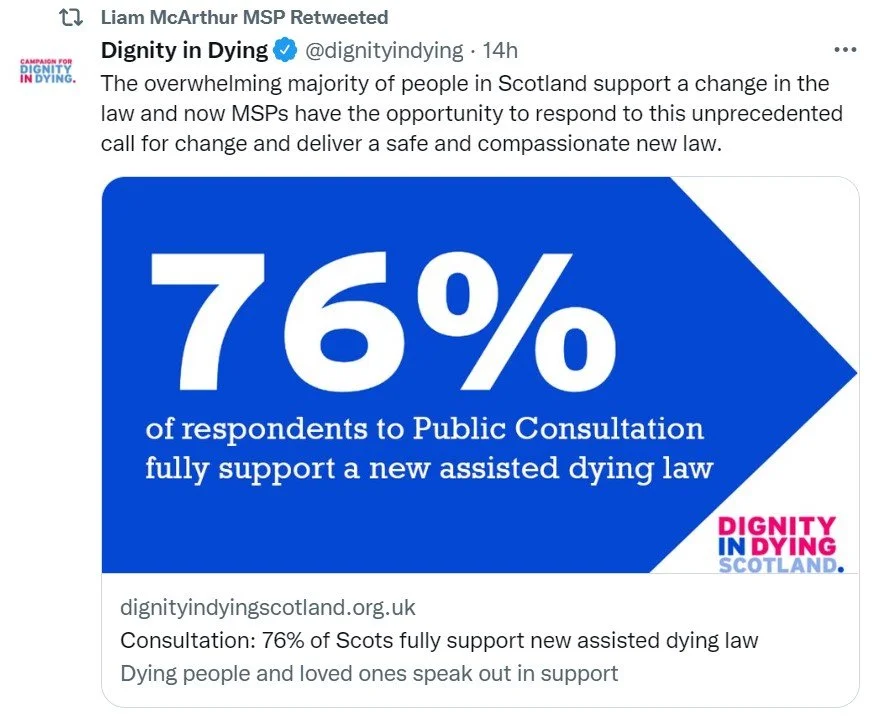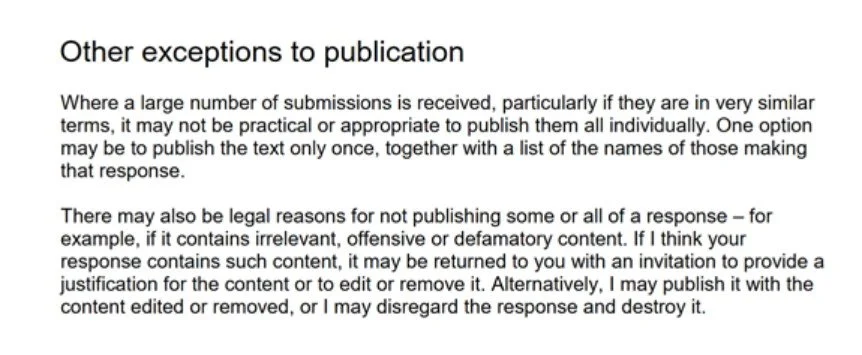“Consultation Responses for the Proposed Assisted Dying for Terminally Ill Adults (Scotland) Bill”
The Member of the Scottish Parliament [MSP] for the Orkney Islands — Mr. Liam McArthur — is pushing for the introduction of Assisted Suicide [AS] into Scotland.
Last year, McArthur submitted the initial proposal for AS legislation and in September he initiated the required public consultation. The public consultation ran September 23, 2021 through December 22, 2021. (The link to my article on McArthur’s proposal is at the end of this article.)
The Non-Government Bills Unit of the Scottish Parliament collated all online responses and wrote the first 3 sections of the report. (The NGBU is a “clerking team within the Parliament” designed to provide “advice, guidance and support to MSPs interested in proposing a Member’s Bill.” ) The consultation process is heavily influenced by the originating MSP and all of the documents can be found here.
It is impossible to make a detailed review of a 40,000 word document without writing a tome, so this critique is limited to a few of the most pertinent issues. (I avoid quoting individual respondents, so as not to cause any further distress.)
TIMING OF RELEASE
The release date of public consultations is decided by the individual MSP involved. Liam McArthur released this summary document on 8th September 2022 — the day Queen Elizabeth II, died. (The date is confirmed on the Scottish Parliament’s website. See below:)
Most everyone in the British Isles knew earlier this week that the 96-year old Sovereign was failing. There were reports about the Queen’s deteriorating mobility & health over the previous few days. The last solo photograph of Elizabeth II was taken on the 6th September by photographer Jane Barlow during the meeting at Balmoral where the Queen’s was inviting the new leader, Liz Truss, to become the new PM. The Queen looks extremely frail.
McArthur had a full 9 months to prepare and had the option to release the consultation document any time before, or after, that fateful day. He can claim this was ‘just an unfortunate coincidence’ but McArthur is no rural hack — he is the Deputy Presiding Officer of the Scottish Parliament, and very likely one of the first people in Scotland to be officially informed of Her Majesty’s condition. What better time to avoid media scrutiny?
The morning of the 8th September, McArthur knowingly RT’d a tacky Tweet from Dignity in Dying Scotland, who were obviously prepared for the release that day.
How they came to this misleading “76%” statistic is shown below.
The summary also confirms McArthur’s close relationship with Dignity in Dying Scotland, and two other Pro-AS groups: “Liam McArthur’s work on his proposal is supported by three organisations: Dignity in Dying Scotland; Humanist Society Scotland; and Friends at the End.”
EXCLUSION OF 3,352 SUBMISSIONS
Section 2, presents basic statistics and commented that:
“A campaign, fully opposed to the proposal, was organised by the Right to Life organisation. 3,352 emails were received by Liam McArthur, on the same day all from the same organisational email address (but copied to different email addresses, seemingly those of individuals) as part of the campaign.
Given that the responses all came from the same email address (that of the Right to Life organisation), and the identical/very similar nature of the responses, they have not been counted as individual responses and are not counted in the data presented in the summary.“
The 2021 consultation document explains that McArthur is allowed to exclude some responses, so it was probably his decision to exclude the 3,352 individual submissions, rather than the NGBU.
(Clipped from the consultation document)
Right To Life UK has noted that Dignity in Dying, similarly mobilized their supporters, and that their submissions were not excluded. They also assert that their campaign met the criteria specified by the Consultation Process. (Press release - “Rigged” consultation - 3,526 submissions opposing assisted suicide removed from Scottish assisted suicide consultation (righttolife.org.uk) )
Right to Life UK is now calling for an independent inquiry from the Scottish Parliament (now conveniently closed till further notice.)
One way to ensure visible neutrality in a survey is to have all results collated by the independent agency. McArthur received the e-mail & regular-mail responses. It is unacceptable the lead person, especially one who is proposing such profound changes to societal norms, gathering any of the results.
Similarly, McArthur caused additional bias when he directly encouraged 57 constituents to respond to the consultation, because he knew they supported assisted suicide.
(Sentence clipped from the consultation responses document.)
NUMERICAL TALLY OF RESPONSES
There is a natural bias with this sort of open consultation because those who are truly motivated are likely to respond. In this consultation that is likely to be those family members who have experienced the “bad death” of a loved one, or the few who are currently experiencing (or fear experiencing) a “bad death.”
Another weaknesses is that a response from a single person was tallied in the same way as a single response from an organization (whose members may not then have written individual responses.)
The 2021 population of Scotland was 5,515,000 people and the reported number of responses as 14,038 (*NOT adding the 3,352 excluded people.) This calculates to a response rate of only 0.25% of the total population of Scotland. (So, Dignity in Dying is touting 76% of 0.25% of the Scottish population!)
As the most motivated are likely to have responded to the consultation, the opinion of less than 0.2% of the Scottish population can in no way be extrapolated to the population at large — definitely not in the way McArthur & Dignity in Dying Scotland are suggesting.
The summary document even makes this point: “In interpreting this data, it should be borne in mind that respondents are self-selecting, and it should not be assumed that their individual or collective views are representative of wider stakeholder or public opinion.”
People in the consultation were not asked about particular adverse outcomes with the introduction of AS, such as the likely increase in regular non-assisted suicides.
People were not asked about alternatives such as guaranteed access to expert palliative care.
I saw no verification of respondents by the NGBU to ensure that they were legally entitled to complete the consultation.
A particular anomaly is that approximately 1/3 of all submissions cannot be identified to a particular person, or their comments have been withheld. Apparently, about 25% of people requested to stay anonymous and a further ~10% requested that their responses not be published. This makes it impossible for any external agency to verify a very large number of submissions, to any reasonable degree.
“9,051 (64.5% of all submissions) published and attributed submissions;
3,665 (26% of all submissions) anonymous submissions; and,
1,322 (9.5% of all submissions) submissions that the respondent marked “not for publication”.
ANTI-RELIGIOUS BIAS
Such bias is even mentioned in the document:
“Many such responses also believed that some religious groups and individuals had had a disproportionate influence on the wider societal debate on assisted dying and were seeking to impose their own beliefs on people who did not share them.”
McArthur wrote the fourth section of the summary, and went on to showed his anti-religious bias:
“As noted in the summary report, much of the opposition from both organisations and individuals appears to be based on religious or faith-based concerns.”
The National Secular Society wrote:
“Strong opposition to assisted dying comes from religious leaders who regard life as sacred and assisted dying as intrinsically harmful. Their views are frequently rooted in religious beliefs and scriptures rather than scientific evidence…However, the over-representation of religious groups and the special status granted to religious groups currently impose a disproportionate level of influence.”
Evidently, the slightest whiff of ‘religious belief’ invalidates all opposing opinion!
A-religious humanists like Assoc Prof. Dr. Kevin Yuill who oppose assisted suicide, are often treated like ‘traitors to the cause.’ Society must protect itself and hold onto long-held principles against assisting the suicide — or the killing / euthanasia — of its citizens. Canada is an example of how badly wrong this can go: euthanasia was recently offered to a Canadian military veteran suffering from PTSD.
MISREPRESENTATIONS
Dignity in Dying Scotland stated:
“Systematic reviews have examined the uptake of assisted dying amongst vulnerable people, including people with disabilities. One concluded that the hypothesis that people with disabilities might be disproportionately impacted ‘does not seem to be borne out’, and that ‘in no jurisdiction was there evidence that vulnerable patients have been receiving euthanasia or physician-assisted suicide at rates higher than in the general population... data do not indicate widespread abuses of these practices.’ Disability Rights Oregon, an organisation committed to protecting Oregonians living with disabilities, has never been received a complaint of abuse or attempted abuse under Oregon’s law.”
This carefully-worded paragraph still misrepresents many issues which have been clearly refuted. (See my previous article)
Aside, it is unforgivable that the Assisted Suicide Movement is inducing a profound fear of death in dying people.
Kevin Hay






